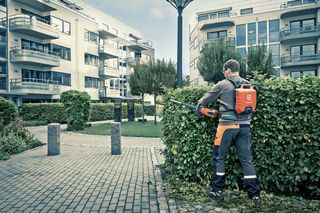
Hedge Trimming Legislation - How Do The Laws Affect You?
The reasons to keep your hedges maintained are not only aesthetic, but can be legal too. Before you use your Husqvarna hedge trimmer, read about the legislation around hedge trimming and maintenance in the UK so that you know your responsibilities and rights.
The reasons to keep your hedges maintained are not only aesthetic, but can be legal too. Before you use your Husqvarna hedge trimmer, read about the legislation around hedge trimming and maintenance in the UK so that you know your responsibilities and rights.
Hedge Trimming Legislation – Discover How the Laws on Hedge Trimming Affect You
If you have a hedge on your property, legislation around high hedges and hedge trimming gives you a degree of responsibility to ensure that it is properly maintained. This includes ensuring that the hedge is kept tidy and at an appropriate height, that it is maintained by the right person, and that any trimming is done at the right time of year so that it will not affect local wildlife.
This overview on hedge trimming legislation in the UK will help you in using your Husqvarna hedge trimmer correctly, and also aid in preventing or resolving any disputes between you and your neighbours that may arise over the maintenance of hedges on your property.
Responsibility for trimming hedges
Whether due to height, size, or confusion over ownership, hedge maintenance is a common source of neighbourly disagreement. However UK laws on hedges do offer clarification on who is responsible for taking care of hedges on domestic properties.
Boundary hedges between properties are in fact the responsibility of both neighbours, but the ownership depends on which side of the defined property boundary lines the hedge is growing. You are permitted to trim back any branches or roots that encroach the boundary line onto your property, whether manually or by using a petrol hedge trimmer or cordless hedge trimmer; however if you cut back any further and go over the boundary line, legally you could be taken to court for damaging your neighbour’s property – so use your trimmer with care.
The neighbour that owns the hedge must ensure that it is well maintained enough that it does not cause any damage to their own or their neighbour’s property, or grow too high. The section on high hedges below will explain the law on hedges over 2 metres tall. Notice must also be given to the neighbour on the other side of the hedge if any major work is to be carried out, such as coppicing, laying, or removing the hedge altogether.

When to trim your hedge
Under Section 1 of the Wildlife and Countryside Act 1981, it’s an offence to intentionally damage or destroy a wild bird’s nest while it is being built or in use. That includes consciously using a hedge trimmer when there is a bird’s nest in your hedge, and in the process of doing so, causing the nest to be damaged or destroyed.
For this reason, bird conservation organisations such as the RSPB recommend that you do not use hedge trimmers between March and August, when the main breeding season for nesting birds occurs. Outside of these months you should still perform checks on your hedges to make sure there are no birds or other wildlife living in them before you begin cutting.
High hedges
Overly tall hedges have been the cause of so many neighbourly disputes that high hedge legislation was included in the Anti-Social Behaviour Act 2003: Part 8 in 2005. The legislation is very specific, but to generalise it defines a ‘high hedge’ as any hedge that is over 2m (approximately 6¾ft) tall; a line of two or more trees or shrubs; and formed wholly or mostly from evergreens or semi-evergreens. Long reach hedge trimmers can help you to keep your hedge at an acceptable height.
This is important because when a high hedge is so tall that it affects enjoyment of a home or garden - whether because it obstructs light, obscures a view, or is overbearing – it is considered to be a form of anti-social behaviour. The high hedge legislation enables the aggrieved neighbour to take steps to resolve the situation without having to involve lawyers, and if further action is needed the local council can be involved.
We hope that this information has been helpful, and that you have more confidence with using your battery or petrol hedge trimmer safely within the law. If you are unsure about any part of the UK hedge legislation, we recommend contacting your local council for more advice.








